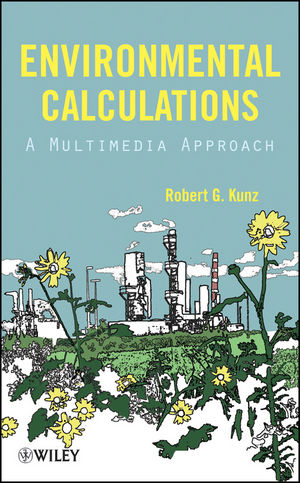Environmental Calculations: A Multimedia ApproachISBN: 978-0-470-13985-1
Hardcover
544 pages
September 2009
 This is a Print-on-Demand title. It will be printed specifically to fill your order. Please allow an additional 15-20 days delivery time. The book is not returnable.
|
||||||
Acknowledgments.
1. Introduction.
1.1 Who, What, Why, and How of This Book.
1.2 Potential Users.
1.3 Arrangement.
1.4 Truths and Myths About Environmental Control.
1.5 Adequate Preparation Is the Key.
1.6 A List of Do’s.
1.7 And At Least One Don’t.
1.8 Author’s Supplemental Disclaimer.
References.
2. Basic Concepts.
2.1 Basic Chemistry.
2.2 The Ideal Gas.
2.3 Concentrations and Mass Flow Rates.
2.4 Vapor Pressure.
2.5 Henry’s Law.
2.6 Vapor–Liquid Equilibrium.
2.7 Energy Balances and Heat Transfer.
2.8 A Smattering of Statistics.
References.
3. Air Combustion.
3.1 Introduction.
3.2 Combustion.
3.3 Fuel.
3.4 Air.
3.5 Water.
3.6 Combustion Calculations from Basic Principles.
3.7 Flue Gas.
3.8 Combustion Calculations Based on EPA Method 19 F Factors.
3.9 Combustion Problems: Major Species in the Flue Gas.
3.10 Adiabatic Flame Temperature.
3.11 Estimation of Pollutant Emissions.
3.12 The Stack Test.
3.13 Continuous Emission Monitoring Systems.
3.14 Miscellaneous Sources of Air Emissions.
References.
4. Air Control Devices.
4.1 Overview.
4.2 Flares.
4.3 Selective Catalytic Reduction.
4.4 Selective Noncatalytic Reduction.
4.5 Flue Gas Recirculation.
4.6 Water/Steam Injection into Combustion Gas Turbine.
4.7 Low-Temperature Oxidation (Ozone Reaction/Scrubbing).
4.8 Particulate Removal.
4.9 Flue Gas Scrubbing.
4.10 Atmospheric Dispersion.
References.
5. Water/Wastewater Composition.
5.1 Introduction.
5.2 Concentrations Expressed as mg/L as CaCO3.
5.3 Dissolved Oxygen.
5.4 Nonspecific Indicators of Water Pollution.
5.5 BOD, COD, and TOC in Industrial Wastewater.
5.6 Domestic Wastewater (Also known as Sewage).
5.7 Dissolved Oxygen Concentration in a Receiving Stream.
5.8 Alkalinity.
5.9 The Nitrogen Cycle.
5.10 Chlorination/Dechlorination.
5.11 Petroleum Oil.
5.12 Cooling Water Operations.
5.13 Boiler Operations.
References.
6. Water/Wastewater Hydraulics.
6.1 Measurement of Effluent Flow.
6.3 Meeting Water Quality Limits.
6.6 Back to the Manning Equation.
References.
7. Water/Wastewater Draining of Tanks.
7.1 Introduction.
7.2 Time to Drain Tanks.
7.3 Trajectory of the Jet from a Leaking Tank.
References.
8. Solid Waste.
8.1 Introduction.
8.2 Selected Waste Designations/Definitions.
8.3 Waste Analysis.
8.4 Calculations for Solid/Hazardous Waste Permitting.
8.5 Waste Incineration.
References.
9. Noise.
9.1 General.
9.2 Sound Versus Noise.
9.3 Sound Properties.
9.4 Frequency Spectrum.
9.5 The Octave.
9.6 Combining Decibels.
9.7 Composite Sound Level.
9.8 Speech Interference.
9.9 A-Weighting Statistics.
9.10 Noise Regulations.
9.11 Industrial Noise.
9.12 Sound Propagation from Point Source to Receptor.
9.13 Excess Attenuation of Noise over Distance.
9.14 Highway Noise (A Line Source).
9.15 Noise Control.
9.16 The Community Noise Survey.
References.
10. Radioactive Decay.
10.1 Definitions and Units.
10.2 Some Sources of Radioactivity.
10.3 Types of Radioactive Decay.
10.4 Pathways of Radioactive Decay.
10.5 Decay Series.
10.6 Longer Decay Chains.
10.7 Rate of Decay in a Radioactive Series.
10.8 A Transition from Science to the Realm of Regulatory Control.
10.9 Some Notable Accidents Involving Nuclear Materials.
10.10 Governmental Regulations and Licensing Procedures.
10.11 Radioactive Waste Disposal.
References.
Appendix A. Suggested Undergraduate Environmental Curriculum.
Appendix B. Relationship among Expressions for Atmospheric Contaminants as Concentrations (ppm), Mass Flow Rates (lb/h), and Emission Factors (lb/MMBtu).
Appendix C. Burner NOx from Ethylene Cracking Furnaces.
Appendix D. What Is BOD and How Is It Measured?
Appendix E. Cooling Water Calculations.
Appendix F. Increase in Runoff from Industrial/ Commercial/Urban Development: The Telltale Bridge.
Appendix G. Water Quality Improvement for a Small River.
Appendix H. Experimental Determination of Coefficient for Draining of Tank.
Appendix I. Noise Case Studies.
Appendix J. Air Pollution Aspects of the Fluid Catalytic Cracking Process.
Appendix K. Case Studies in Air Emissions Control.
Appendix L. Combustion of Refinery Fuel Gas.
Index.



